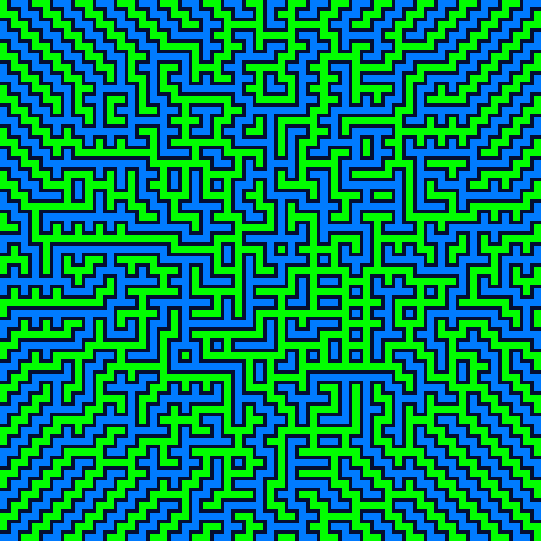(The black lines portray a state of the Fully Packed Loop model.
The blue and green colorings between the lines are there just to make it
look jazzy. The software that created this picture was written by
David Wilson and Matthew Blum.)
The University's of Wisconsin's Spatial Systems Laboratory (that's SSL
for short -- pronounced "sizzle") is a gathering of undergraduates,
graduate students, and UW faculty engaged in exploring mathematical
systems drawn from or inspired by the real world. These models are
simple enough for us to simulate and prove theorems about,
but rich enough in phenomena that we hope that our explorations will
generate insights that may be of interest to people outside of
mathematics.
The featured project for Spring 2001 is a team research effort
focusing on a class of mathematical models involving tilings.
Some of these models have arisen from chemistry and physics,
but our main interest will be on mathematical issues.
Computers will play a large part in the research.
For a graphical introduction to some of the ideas of the project,
take a look at Hal Canary's
"TOAD-shuffling" program
(the source-code for which is also available via a
tar file).
The faculty leader this semester is Prof. James Propp,
and the graduate supervisor is Michael Lang.
Here's a
description
of what we're working on;
or, if you prefer Postscript to PDF,
click here.
This is a reworking of the poster that we contributed
to the University of Wisconsin's Third Annual
Undergraduate Research Symposium
held on April 4, 2001.
You can read the
minutes of all the SSL meetings that were held during Spring 2001.
Or you can just
look at
our group tee-shirt.
For a web-page describing earlier work by undergraduates
on this topic, check out the web-page of the Boston area
Tilings
Research Group. Stay tuned for more details!
SSL undergraduate participants meet for 4 hours a week, and
are expected to invest roughly 6 additional hours per week
outside of group meetings. They are paid on an hourly basis.
You can also find out who has been involved in SSL in past semesters,
and what they've done, by visiting our
vault.
The Spatial Systems Laboratory during Spring 2001 consists of
the following people:
Undergraduate participants:
Active alums:
Graduate students:
Principal investigator:
SSL is sponsored by the National Science Foundation through their
VIGRE (Vertical Integration of Graduate Research and Education)
program, with supplemental support from the National Science
Foundation's REU (Research Experiences for Undergraduates) program
and from the National Security Agency. Additional funding was
provided by NSF under Grant No. 9971884.
This page maintained by
Jim Propp
Last updated June 20, 2002.

